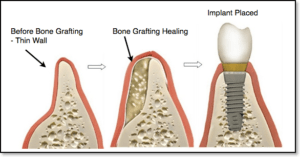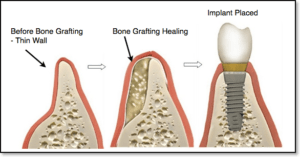
If you’re considering a dental implant but wonder if it’s possible without a bone graft, you’re not alone. Typically, a bone graft ensures implant success by creating a stable foundation. However, advancements sometimes allow implants without grafts if sufficient bone density exists. Your dentist will assess your situation to determine the best approach. While bone grafts are common for implant stability, some cases may not require them, emphasizing the importance of individual evaluation. Consult your dentist to explore options tailored to your specific needs and ensure the best possible outcome for your dental implant.

Can You Get a Dental Implant Without a Bone Graft?
Dental implants are a popular solution for replacing missing teeth and restoring a confident smile. However, in some cases, a bone graft may be required before the implant can be placed. Many people wonder if it is possible to get a dental implant without undergoing a bone graft. In this article, we will explore the answer to this question and provide valuable information on dental implants and bone grafts.
What is a Dental Implant?
A dental implant is a titanium post that is surgically placed into the jawbone to act as a replacement for a missing tooth root. It provides a stable foundation for a dental crown, bridge, or denture. The implant fuses with the jawbone through a process called osseointegration, which allows it to function and feel like a natural tooth.
Getting a dental implant involves several steps, including an initial consultation, implant placement surgery, healing period, and placement of the dental restoration. However, in some cases, additional procedures such as a bone graft may be necessary to ensure the success of the implant.
What is a Bone Graft?
A bone graft is a surgical procedure that involves transplanting bone tissue to a specific area of the body, in this case, the jawbone. It is typically done when there is insufficient bone volume or density to support a dental implant. The graft material can be taken from the patient’s own body (autograft), a donor (allograft), or synthetic materials (alloplast).
The purpose of a bone graft is to create a solid and stable foundation for the dental implant. It provides the necessary support and promotes the growth of new bone cells, ensuring the long-term success of the implant.
Can You Get a Dental Implant Without a Bone Graft?
The need for a bone graft before getting a dental implant depends on the individual case. In some situations, there may be enough existing bone to support the implant without the need for a graft. Factors that determine the need for a bone graft include the quality and quantity of the jawbone, the location of the missing tooth, and the patient’s overall oral health.
If the jawbone has deteriorated or lacks the necessary volume, a bone graft may be required to build up the bone structure before the implant can be placed. This ensures that the implant has a stable foundation and reduces the risk of implant failure.
Alternatives to Bone Grafts
Mini Dental Implants
Mini dental implants offer a solution for patients lacking sufficient bone for traditional implants. These smaller implants require minimal bone grafting, making them suitable for individuals with thin jawbones or limited bone volume.
Zygomatic Dental Implants
Zygomatic dental implants anchor into the cheekbone instead of the jawbone. This technique is ideal for severe upper jaw bone loss, eliminating the need for bone grafts and offering a stable alternative.
Implant-Supported Dentures
Implant-supported dentures combine the stability of implants with the convenience of dentures. Requiring fewer implants, they are suitable even with limited bone volume, offering patients a hybrid solution for their dental needs.
In conclusion, while it is possible to get a dental implant without a bone graft in certain cases, the need for a graft depends on individual circumstances. Consulting with a qualified dentist or oral surgeon is essential to determine the best course of action for your specific situation. With advancements in dental technology, there are alternative options available that can provide a solution even for individuals with limited bone volume.
Key Takeaways: Can You Get a Dental Implant Without a Bone Graft?
- Getting a dental implant without a bone graft is possible in certain cases.
- A bone graft may be necessary if your jawbone doesn’t have enough density or volume.
- Factors like gum disease or tooth extraction can affect the need for a bone graft.
- A dental professional will evaluate your specific situation to determine if a bone graft is needed.
- Alternative options, such as mini dental implants, may be considered if a bone graft is not possible.
Frequently Asked Questions
Can You Get a Dental Implant Without a Bone Graft?
Many people wonder if it is possible to get a dental implant without undergoing a bone graft. The answer to this question depends on the individual’s specific case and the condition of their jawbone. In some cases, a bone graft may be necessary to provide a strong foundation for the dental implant. However, advancements in dental technology have made it possible for some individuals to receive dental implants without a bone graft.
If you have sufficient bone density and volume in your jaw, your dentist may determine that a bone graft is not necessary. This is often the case for individuals who have recently lost a tooth or have had a tooth extracted. The extraction site can sometimes be prepared for an implant immediately, without the need for a bone graft.
What factors determine the need for a bone graft?
The need for a bone graft before receiving a dental implant is determined by several factors. One of the main factors is the amount of bone available in the jaw to support the implant. If there is not enough bone present, a bone graft may be necessary to build up the jawbone and create a stable foundation for the implant. Other factors that may influence the need for a bone graft include the location of the missing tooth, the overall health of the patient, and the type of implant being used.
Your dentist will thoroughly evaluate your specific case to determine whether a bone graft is necessary. They will take into consideration your dental history, perform X-rays or CT scans, and conduct a comprehensive examination of your oral health. Based on this assessment, they will recommend the most appropriate treatment plan for you.
What does a bone graft procedure involve?
If a bone graft is deemed necessary for a dental implant, the procedure typically involves taking bone from another part of your body or using a synthetic bone grafting material. The graft material is then placed in the area where the implant will be inserted. Over time, the graft material fuses with the existing bone, creating a strong and stable foundation for the implant.
The bone graft procedure is usually performed under local anesthesia to ensure your comfort. Once the graft has healed and integrated with the jawbone, your dentist can proceed with the dental implant placement. The entire process may take several months to complete, allowing for proper healing and osseointegration.
Are there any alternatives to a bone graft for dental implants?
In some cases, individuals who do not have sufficient bone for a traditional dental implant may be candidates for alternative procedures. One such procedure is the use of mini dental implants, which are smaller in size and require less bone for placement. These implants can be a suitable option for individuals with limited bone volume or density.
Another alternative is the All-on-4 dental implant technique, which uses fewer implants to support a full arch of teeth. This technique aims to maximize the use of available bone and avoid the need for extensive bone grafting. However, not everyone is a candidate for these alternative procedures, and they may not be suitable for all cases.
What should I do if I need a bone graft for a dental implant?
If your dentist determines that a bone graft is necessary for a dental implant, it is essential to follow their recommendations and treatment plan. Bone grafting can help ensure the long-term success and stability of your dental implant. Consult with a qualified oral surgeon or periodontist who specializes in implant dentistry to discuss your options and understand the procedure in detail.
Remember, each case is unique, and what may be suitable for one person may not be the best option for another. Trust your dental professional’s expertise and guidance to determine the most appropriate treatment plan for your specific needs.
Do I need Bone Grafting for my Dental Implant?
Final Summary: Can You Get a Dental Implant Without a Bone Graft?
While some patients may be eligible for dental implants without a bone graft, others may need this additional procedure to ensure the success and longevity of their implant. Bone grafts provide the necessary support and stability for the implant by strengthening the jawbone. However, advancements in dental technology have allowed for alternatives to traditional bone grafts, such as mini implants or zygomatic implants, which may be suitable for patients with insufficient jawbone density.
The decision to proceed with a dental implant without a bone graft should be made in consultation with your dentist. They will assess your individual case and determine the best course of action. Remember, the primary goal is to achieve a healthy and functional smile that lasts a lifetime. So, trust in the expertise of your dental professional and explore all available options to find the solution that suits your specific needs. With advancements in dental science, it’s possible to overcome the limitations and enjoy the benefits of dental implants, even without a bone graft.
Call or Book appointment online
:Ace Dental Care Alpharetta office: 678-562-1555 - Book Now
Ace Dental Care Norcross office: 770-806-1255 - Book Now
Disclaimer
This blog post was generated by artificial intelligence. The content of this post may not be accurate or complete, and should not be relied upon as a substitute for professional advice. If you have any questions about the content of this post, please contact us.
We are constantly working to improve the accuracy and quality of our AI-generated content. However, there may still be errors or inaccuracies. We apologize for any inconvenience this may cause.





